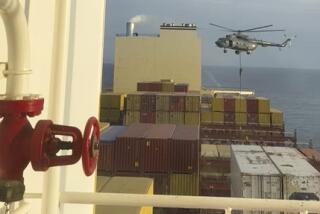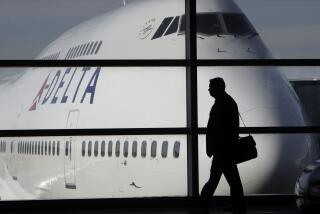Pan Am Halts Flights to Tel Aviv and Riyadh : War-Risk Insurance Cited; Airline Asks FAA to Pick Up Cost
- Share via
Faced with huge war-risk insurance premiums, ailing Pan American World Airways said Thursday that it would suspend for one week flights to Israel and Saudi Arabia.
Pan Am’s action is the most dramatic response yet by an airline to the increased danger of war in the Persian Gulf. Within the last few weeks, other airlines have quietly rerouted flights to avoid overnight stays in Israel. And a number of airlines have dropped service to Iraqi neighbor Jordan due to a sharp slide in tourism.
The war-risk insurance surcharges affect all airlines, but cash-starved Pan Am can least afford them. The airline said that for each flight to Tel Aviv, it would have to pay $162,000, a 10-fold increase. Each flight to Riyadh, Saudi Arabia, would cost $65,000, a 20-fold jump.
Pan Am’s insurance broker, New York-based Frank B. Hall Inc., couldn’t be reached.
Pan Am said it is booking its ticket-holders on other airlines and that it has asked the Federal Aviation Administration to cover its insurance costs so it can resume flights. The government can pick up an airline’s premiums if it finds the flights are in the best interests of the country.
Last summer, the government insured a flight by New York-based Tower Air to Saudi Arabia after Tower was unable to obtain private insurance in the wake of the Iraq’s Aug. 2 invasion of Kuwait.
Tower, mainly a charter carrier, continues to fly to Tel Aviv but has reduced the number of weekly flights from five to two. Keith Cotler, Tower’s marketing director, said the airline is likely to absorb higher insurance premiums initially. “If it gets too out-of-hand, that means it is probably too dangerous to fly, and we would probably cease operations,” he said.
A spokesman for Trans World Airlines, Pan Am’s chief transatlantic rival, said it will continue with its six weekly flights to Tel Aviv from Paris, despite the huge jump in premiums. TWA does not fly to Saudi Arabia.
However, a State Department official who is monitoring the air travel situation in the gulf region said TWA is expected to seek government help with its insurance costs. The official said the State Department supports Pan Am’s request for aid.
It is not unusual for airlines to halt flights to risky areas--though in many cases, the suspensions result from a lack of bookings, rather than insurance costs.
TWA, for example, canceled its Cairo-Athens-Rome flight in 1986, after a terrorist bomb blew a hole in a TWA jet on the route, killing four people. And Pan Am suspended flights to Athens in 1985, after a TWA flight from Athens was hijacked.
Most airlines that normally fly to Iraq and Kuwait from Europe suspended service after the Aug. 2 invasion. It is not possible to obtain insurance to fly to those countries, industry spokesmen said.
Insurance industry executives said war-risk surcharges started to rise after the invasion, but remained fairly stable until this week. The surcharges are set in London--the center of the so-called hull insurance industry--and cover damage to the aircraft itself. Insurance industry executives said that airlines are also paying additional liability premiums for injury to passengers, but those surcharges vary by airline.
Insurance carriers in London have reviewed the war-risk surcharges each Tuesday since the Mideast crisis began. The group raised the surcharges dramatically on Wednesday, as the possibility loomed that Iraq might not withdraw from Kuwait by the Jan. 15 deadline set by President Bush, heightening the risk of war.
This is not the first time insurance questions have come up during the gulf crisis.
Airlines that fly military charters into the gulf region earlier voiced concern about their liability if a jet was damaged and troops were injured. In response, the Military Airlift Command has recently started issuing standard boarding passes to troops. The boarding passes state an airline’s liability is no greater than that on a regular commercial flight.
Though Pan Am is the only carrier to drop its service to Israel and Saudi Arabia, other airlines have taken precautions. British Airways, Swiss Air and KLM Royal Dutch Airways have changed their flight schedules to avoid overnight stays in Israel. British Airways’ flight crews, for example, now stay overnight in Athens.
“Insurance premiums are up across the board,” said Odette Fodor, a KLM spokeswoman.
Several European carriers said they had dropped some Mideast flights and may cancel others, largely due to a decline in travel to the troubled region. KLM said it canceled flights to Amman, Jordan, on Wednesday, and that it plans to reduce its weekly flights to Tel Aviv from four to three.
British Air said that on Jan. 15 it plans to reduce weekly flights to Tel Aviv from six to four due to a 50% decline in traffic from London. Lufthansa German Airlines said it will no longer serve Amman, effective Jan. 31. A Lufthansa spokesman blamed a sharp drop in winter tourism to the Red Sea.
A spokeswoman for El Al Israel Airlines said the Israeli government has asked it to pick up the slack created as other airlines reduce flights. El Al is considering whether to add flights, the spokeswoman said.
Perhaps hardest hit are tour operators that specialize in the Mideast.
Klames M. Ganji, president of Babylon Travel & Tours Service with offices in Chicago and Modesto, said revenue is off 90% at his business, which specializes in trips to Baghdad.
“Nobody wants to go anymore,” he said. “Business is dead.”
A PREMIUM FOR WAR COVERAGE The prospect of war in the Persian Gulf has sent skyrocketing the cost of insuring airplanes that fly to the region. Before Wednesday, carriers paid $12,500 to $25,000 per flight to insure a $50 million Boeing 747 wide-body jet. New war-risk surcharges established by London insurers on Wednesday added the following charges per flight:
For flights to . . .
Saudi Arabia north of the Tropic of Cancer: +$125,000
Israel: +$125,000
Jordan: +$100,000
Saudi Arabia south of the Tropic of Cancer: +$50,000
Egypt: +$37,500
Iran: +$25,000
No figures are being quoted for flights to Iraq or Kuwait.
Source: Johnson & Higgins.
*INSURANCE CRISIS
Premiums have skyrocketed for firms doing business in the Middle East. A1
More to Read
Inside the business of entertainment
The Wide Shot brings you news, analysis and insights on everything from streaming wars to production — and what it all means for the future.
You may occasionally receive promotional content from the Los Angeles Times.










